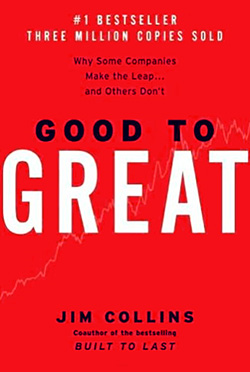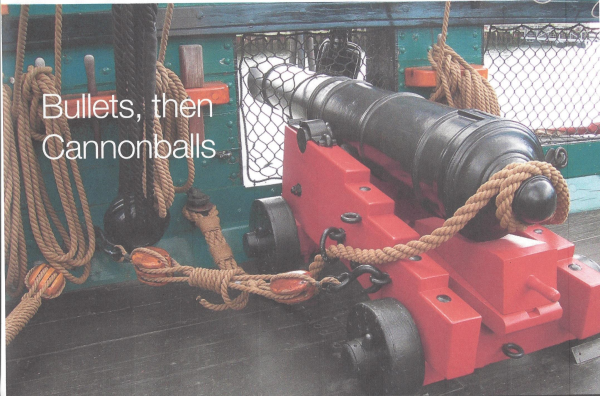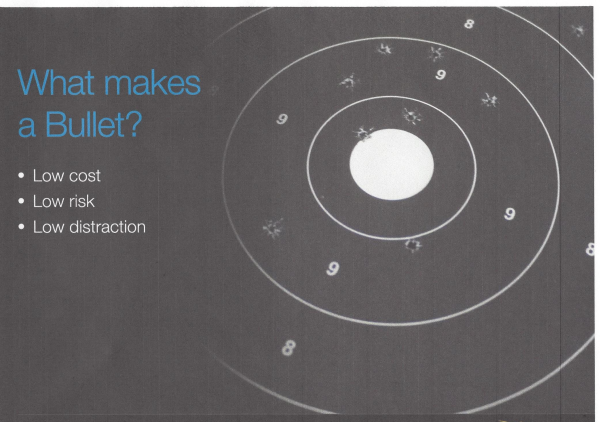Have you wanted to move your company from Good to Great? -resized-600.jpg?width=72&height=107&name=good-to-great_(2)-resized-600.jpg) Jim Collins offered 12 Questions to help you do exactly that at the recent Australian Growth Summit.
Jim Collins offered 12 Questions to help you do exactly that at the recent Australian Growth Summit.
We’ve been exploring these questions with Jim Collins comments as well and insights from my experience working with our Positioning Systems and Gazelles customers. If you wish to explore the previous blogs on questions 1 & 2 as well as questions 3-5, simply click on the links.
Let’s continue our journey with questions 6-9:
6. Where should we place our big bets, based on the principle “Fire Bullets, then Cannonballs”—blending creativity and discipline to scale innovation?
-resized-600.jpg?width=258&height=170&name=great_by_choice_-_bullets_than_cannonballs_(ip)-resized-600.jpg) Collins question comes from Great by Choice, where he discovered that great companies (those that thrive in any economic environment) gather evidence about what they are capable of by firing “small bullets” before they decide to launch a big bet or “cannonball.”
Collins question comes from Great by Choice, where he discovered that great companies (those that thrive in any economic environment) gather evidence about what they are capable of by firing “small bullets” before they decide to launch a big bet or “cannonball.”
Here’s the example from Great By Choice: In 1980, a recombinant-DNA technology start-up that would become Amgen began firing bullets. With no CEO, product, marketing plan or specific direction, they began firing bullets, throwing recombinant-DNA technology at anything they could think of.
BULLET: Leukocyte interferon, for viral diseases. BULLET: Hepatitis-B vaccine. BULLET: Epidermal growth factor, for wound healing and gastric ulcers. BULLET: Immunoassays, to improve medical-diagnostic tests. -resized-600.jpg?width=264&height=185&name=great_by_choice_-_what_makes_a_bullet_(ip)-resized-600.jpg) BULLET: Hybridization probes, for diagnostics in cancer, infectious disease, and genetic disorders. BULLET: Erythropoietin (EPO), for treating anemia in chronic kidney disease. BULLET: Chicken growth hormone, to build better chickens. BULLET: Bovine growth hormone, to get more milk from cows. BULLET: Growth-hormone-releasing factors. BULLET: Porcine-parvovirus vaccine, to increase reproductive rates in pigs. BULLET: Transmissible-gastroenteritis-virus vaccine, for intestinal infections in piglets. BULLET: Bioengineered indigo to dye blue jeans.
BULLET: Hybridization probes, for diagnostics in cancer, infectious disease, and genetic disorders. BULLET: Erythropoietin (EPO), for treating anemia in chronic kidney disease. BULLET: Chicken growth hormone, to build better chickens. BULLET: Bovine growth hormone, to get more milk from cows. BULLET: Growth-hormone-releasing factors. BULLET: Porcine-parvovirus vaccine, to increase reproductive rates in pigs. BULLET: Transmissible-gastroenteritis-virus vaccine, for intestinal infections in piglets. BULLET: Bioengineered indigo to dye blue jeans.
EPO showed the most promise and “as the science progressed and Amgen scientists isolated the EPO gene, Amgen allocated more gunpowder, moving into clinical trials, proving efficacy, securing a defensible patent, and so on. Then, with the science done and the market assessed (200,000 chronic-kidney-disease patients in the United States), Amgen fired a cannonball, building a testing facility, allocating capital to manufacturing, and assembling a launch team. EPO became the first super-blockbuster bioengineered product in history.
Any move you make especially a big one involving major resources, of time, management, capital and research should be tested first. Get employee and customer feedback to help sharpen your approach. Ready, Fire, Aim may work in many cases, but with big investments it’s better to be sure you’re on target first.
Collins notes, “Go big but with empirical validation.”
7. Do we show any signs of How the Mighty Fall, and do we have enough Productive Paranoia to stay far above the Death Line?
In How the Mighty Fall Collins shares the five stages of decline. Just this week one of my clients and I were discussing a company that has built a significant reputation in creating great musical instruments. They have a reputation for being the best, yet when it comes to dealing with them versus their competitors they have arrogance or what Collins call hubris. My customer feels they are out of touch with the market. As Collins notes, “Success coupled with arrogance is the start of decline.”  There are five stages to the death line. If you wish to understand this more read How the Mighty Fall, A Primer on the Warning Signs, Jim Collins.
There are five stages to the death line. If you wish to understand this more read How the Mighty Fall, A Primer on the Warning Signs, Jim Collins.
From Great by Choice, Collins notes the value of productive paranoia. Past success does not entitle any business to future success. Great leaders and companies have a “distrust of their success, a distrust that it will hold.” “Be grateful but fearful,” Collins states, “The world will not always be kind.”
My experience with the best leaders are they are constantly wary, never satisfied even with an extraordinary achievements. They often nitpick and see the gaps where things could have been better. Most of all they are always striving to get better and make sure their team is doing so as well.
8. How can we do a better job at Clock Building, not just Time Telling?
Can your business tell the time without you being there as their leader? This is a lesson from Good to Great echoed in countless other books perhaps most notably Michael Gerber’s E-Myth Revisited, Why Most Small Businesses Don’t Work and What to Do about It. “The company will only be great when you’re not needed,” Collins told the audience at the Australian Growth Summit. “Level 5 leaders are clock builders not time tellers,” Collins noted. Time tellers require the leader to tell time or get the work done. They need you to constantly check in with them and ensure things are getting done right. A company with a level 5 leader can tell time even when the leader isn’t there.
In Collins diagnostic tool for measuring greatness he mentions three primary components to Clock-Building:
1) Build a system that can be great beyond any single leader or great idea.
2) Create catalytic mechanisms.
3) Manage for the quarter century
You might wish to take the Good to Great diagnostic tes to find out how you are doing.
9. How can we increase our Return on Luck (ROL), making the most of our good luck and bad?
How do you view luck in your business? Morten T. Hansen co-authored Great by Choice with Jim Collins and his article You Can Manage Luck. Here’s How distills a lot of the nuggets from the book. Collins noted that, “Luck favors the persistent…true creators stay in the game. If you think life comes down to a single lucky hand, you lose.” Do you believe as I do that luck is, “preparedness meeting opportunity?” If you do chances are you have the discipline and productive paranoia that one day your luck will run out. That is what Great by Choice found 10xer’s had in order to be successful.
If you’re looking at your competitors and wondering why they always get so lucky chances are you have the wrong mindset for this game. In Great by Choice they measured the amount of luck the comparison companies had to the 10Xer’s. The difference between the 10Xers and the comparison company’s was how they managed to use their luck.
Bad luck isn’t bad luck unless it produces an outcome that is distasteful or unpleasant. Every sour has its sweet. The key is to look for the good in every event or outcome. What can you learn from this to help you get better. Taking a negative outcome and transforming it into a learning lesson where you, your organization, and your people can improve is what separates achievers from mediocre performers.
Three more questions to explore to take your company from Good to Great. Questions 10-12 are ahead next blog






.jpeg?width=150&height=135&name=Hand%20with%20marker%20writing%20the%20question%20Whats%20Next_%20(1).jpeg)

